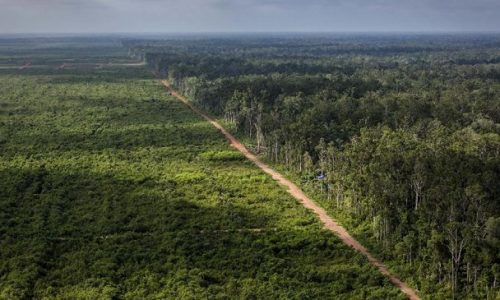The solo paintings exhibition entitled “Kebangkitan: Tanah Untuk Kedaulatan Pangan” (Resurrection: Land for Food Sovereignty) which was planned to be held at the National Gallery from December 20 to January 19, 2025, has finally been canceled.
Painter Yos Suprapto, who was supposed to display 30 of his works in the exhibition, decided to cancel the event after a debate broke out over five paintings that were considered controversial.
The exhibition’s curator, Suwarno Wisetrotomo, had previously asked Yos to remove the five paintings that were considered problematic, but the painter refused.
“The five paintings are closely related to the main theme of my exhibition,” Yos said as quoted in a statement onFriday, December 20, 2024.
As a compromise, he was willing to cover two paintings with black cloth, but this step was rejected by the curator and the National Gallery.
Tensions peaked when the National Gallery turned off the lights in the exhibition room and locked the door, so Yos decided to take all of his paintings back to Yogyakarta, where he lives.
This cancellation raises big questions, especially regarding the role of the curator who should be a bridge between artwork and the public.
“It is very strange when the curator asks the painter to take down his work at the last minute before the exhibition opens,” Yos said.
Political aroma
News of the cancellation of this exhibition has drawn speculation about political pressure. The exhibition was originally scheduled to be opened by the Minister of Culture, Fadli Zon, who then canceled his presence. Some suspect that Yos’ paintings that resemble certain political figures, namely the 7th President Joko “Jokowi”Widodo, were the main reason for the cancellation.
Yos emphasized that the banning of artworks is a form of social decay itself.
“Artists are public intellectuals who capture the decay in society,” he said, while citing that art is an effort to reorganize social grammar and find new meaning for people’s lives.
“The cancellation of this exhibition is an alarm for freedom of expression in Indonesia. In conditions like this, artists are at the forefront of ensuring that art does not dissolve into authoritarianism and remains an effective tool for social criticism,” he added.
Social issues
In his exhibition track record, Yos has never been free from social issues. In 1994, he raised environmental issues in his solo exhibition entitled “United with Nature” at Taman Ismail Marzuki. In 2001, he again held a solo exhibition entitled “Barbarism: Journey of the Nation’s Children” at the National Gallery of Indonesia which criticized the culture of violence in the contemporary national reality.
In 2005, he again raised social issues, this time in the form of criticism of corruption in the elite bureaucratic environment, through a solo exhibition entitled “Republik Udang” at Tembi Gallery, Yogyakarta. In addition, he was also involved in group exhibitions that raised social issues such as the “Mata Hati Demokrasi” exhibition at Taman Budaya Surakarta in 2002.
In 2017, Yos raised an in-depth evaluation of the nation’s cultural journey, especially maritime culture, namely “Arus Balik Cakrawala” which was exhibited at the National Gallery of Indonesia.
In this exhibition, Yos voiced criticism and hopes regarding food sovereignty and Indonesian agrarian culture. The works exhibited combine realistic figuration in the tradition of social realism a la Diego Rivera and Taring Padi, with a touch of surrealist symbolism typical of Yogyakarta artists from the 1980s.
Through provocative lines and colors, Yos depicts a visual story full of messages about the importance of reviving an independent agrarian culture.
“Kebangkitan: Tanah untuk Kedaulatan Pangan” was born from Yos’s long research for more than 10 years on productive land throughout Indonesia. The results show the loss of an independent agrarian culture due to dependence on synthetic fertilizers and the green revolution.
In this work, Yos invites the public to reflect on the importance of revitalizing agrarian culture as an effort to build a sustainable future.









